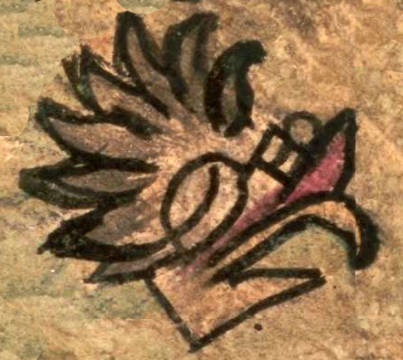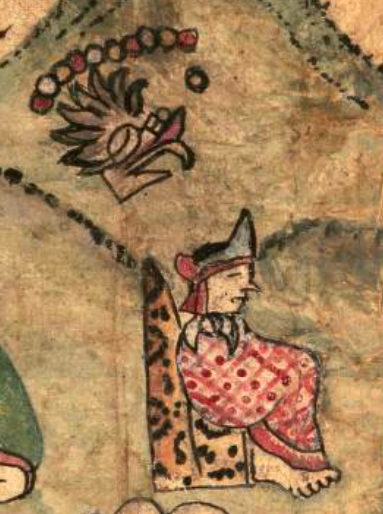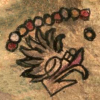Quetzalecatl (CQ)
This compound glyph representing the wind (ehecatl) or its sacred representation (Ehecatl) with added quetzal feathers (quetzalli) is a personal name, Quetzalecatl or, with the reverential ending, Quetzalecatzin. The wind glyph, which is a bird-like head with an added red protrusion and other small features above the top of the open yellow beak, has added green quetzal feathers along the top of its head. Its eye appears to be closed.
Stephanie Wood
Quetzalecatzin (or Quetzalecatl, without the reverential suffix) was a tlahtoani of Tecamachalco (now in the state Puebla) in the fifteenth century. Apparently, his name points to a tradition that links Quetzalcoatl with Ehecatl in the figure of Nahui Ehecatl, as shown in the Codex Telleriano Rememsis. Quiñones Keber "goes on to say that ... it was related to the Tepictoton, or dough image mountain representing the tlatoque or rain gods," according to Viviana Díaz Balsera (Guardians of Idolatry, 2018, 123). The latter adds: "Recall that in the Legend of the Suns, four colored tlatoque snatched the maize bounty that was revealed after lightning (Nanahuatl) opened up the Food Mountain, discovered by Quetzalcoatl (Bierhorst 1992, 146–47; Feliciano Velázquez 1992, 121). Hence, the dual image of Nahui Ehecatl Quetzalcoatl as patron may allude to this tradition."See the added analysis to that figure in this collection (following the link below).
Gabrielle Vail and Christine Hernández (Re-Creating Primordial Time, 2013, ) describe Ehecatl as the wind aspect of Quetzalcoatl, and they note that Ehecatl "wears a buccal (duck) mask through which to blow wind." That the "beak" may have been perceived as a blowing device is supported by the glyph for Pitztli (below).
John Montgomery drew a group of wind glyphs (possibly mainly Mixtec), showing the variety of ways the blowing device might look. It is published in FAMSI, Inc.
Stephanie Wood
covers ruling men and women of Tecamachalco through 1593
names, nombres, vultures, buitres, quetzal birds, birds, feathers, ave, aves, pájaro, pájaros, pluma, plumas, animals, animales

quetzal(li), quetzal feathers, https://nahuatl.wired-humanities.org/content/quetzalli
eca(tl), air or breath, https://nahuatl.wired-humanities.org/content/ecatl
eheca(tl), wind or its divine force, https://nahuatl.wired-humanities.org/content/ehecatl
el viento o la fuerza divina de plumas preciosas.
Ofelia Cruz Morales
The Codex Quetzalecatzin, aka Mapa de Ecatepec-Huitziltepec, Codex Ehecatepec-Huitziltepec, or Charles Ratton Codex. Library of Congress. https://www.loc.gov/item/2017590521/
The Library of Congress, current custodian of this pictorial Mexican manuscript, hosts a digital version online. It is not copyright protected.





